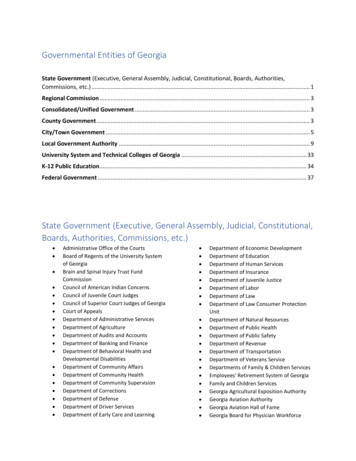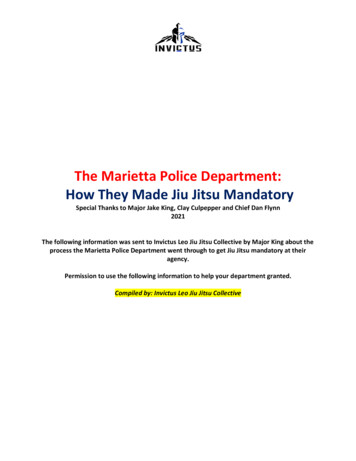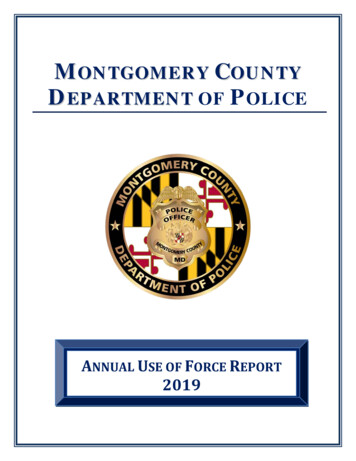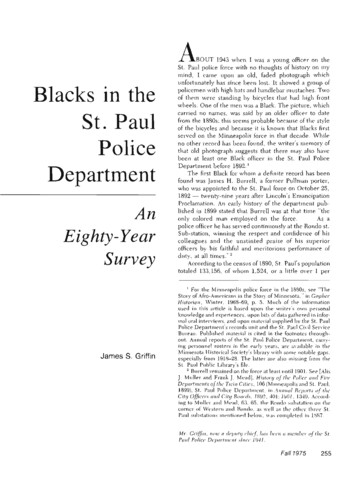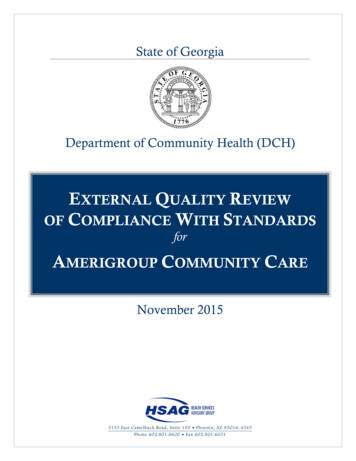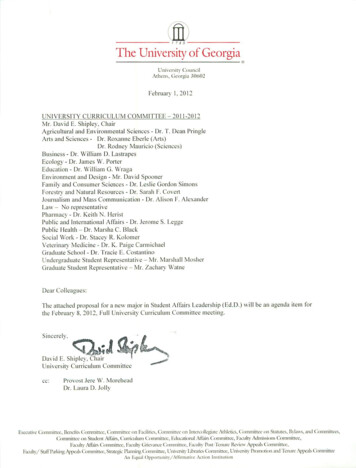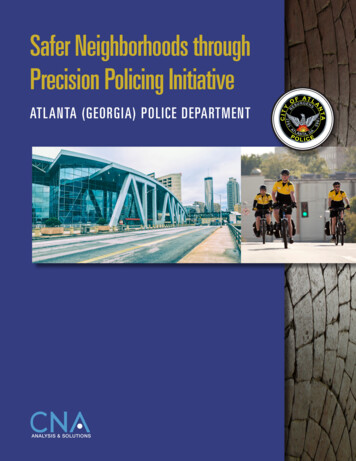
Transcription
AT L A N TA ( G E O R G I A ) P O L I C E D E PA R T M E N TSafer Neighborhoods throughPrecision Policing InitiativeATLANTA (GEORGIA) POLICE DEPARTMENTANALYSIS & SOLUTIONS1
This project was supported, in whole or in part, by cooperative agreement number 2014-CR-WX-K004awarded to CNA by the U.S. Department of Justice, Office of Community Oriented Policing Services.The opinions contained herein are those of the author(s) or contributor(s) and do not necessarilyrepresent the official position or policies of the U.S. Department of Justice. References to specificindividuals, agencies, companies, products, or services should not be considered an endorsement bythe author(s), the contributor(s), or the U.S. Department of Justice. Rather, the references are illustrations to supplement discussion of the issues.The internet references cited in this publication were valid as of the date of publication. Given thatURLs and websites are in constant flux, neither the author(s), the contributor(s), nor the COPS Officecan vouch for their current validity.Recommended citation:CNA Analysis & Solutions. 2019. Atlanta (Georgia) Police Department. Safer Neighborhoods throughPrecision Policing Initiative. Arlington, VA: CNA.Published 2019
AT L A N TA ( G E O R G I A ) P O L I C E D E PA R T M E N TIntroductionThe Atlanta (Georgia) Police Department (APD) is one of 15 lawenforcement agencies selected to participate in the Office of CommunityOriented Policing Services (COPS Office) Safer Neighborhoods throughPrecision Policing Initiative (SNPPI). SNPPI provides policy review,assessments, training, and technical assistance to a cohort of lawenforcement agencies across the nation. The four goals of the initiativeare to identify promising strategies that reduce crime, protect officers’ safety andwellness, establish productive interagency partnerships with law enforcement andcommunity stakeholders, and implement innovative and effective technologies toassist police departments to safeguard neighborhoods.MethodologyEach of the 15 selected departments is assigned a CNA Strategic SiteCoordinator (SSC) and an operations analyst to assist with planning,implementing, coordinating, and delivering technical assistance. CNAworked with the APD to develop a customized strategy to capitalize onthe great work already in progress across the four policing principles. Todo this, CNA looked at the APD’s policies and practices related to crimereduction efforts, policy effectiveness, technological capabilities, trainingstructures and offerings, and officer safety and wellness philosophies. TheCNA team then helped identify training and technical assistance (TTA)opportunities and additional tools and resources to enhance areas relatedto the principles of precision policing. The CNA team documented thesebest practices and will share these initiatives with police departmentsnationwide to promote public safety.1
2Safer Neighborhoods through Precision Policing InitiativeBackgroundEncompassing 133 square miles, the city ofAtlanta is the capital and most populous cityof the state of Georgia, with a population ofapproximately 465,230.1 The APD has anauthorized strength of 2,000 officers.2 Sincethe inauguration of SNPPI, the APD has setin motion numerous strategies to addressviolent crime and public safety issues, initiatemeaningful partnerships, and further enhancethe department.Crime Rates and Trends in AtlantaReducing violent crime in Atlanta is the APD’s top priority. From 2016 to2017, the department saw a 29 percent drop in homicides (from 111 to79) and a 32 percent drop in robberies (from 2,070 to 1,413). Overall, theAPD saw an 8 percent decrease in Part 1 crimes for the year.3Crime Reduction: Promising StrategiesFederal, state, and local partnershipsThe APD’s Narcotics Unit works closely with its local High-Intensity DrugTrafficking Area (HIDTA) and the U.S. Attorney’s Office to address andinvestigate the illicit trafficking and distribution of narcotics, particularlyopioids, in the city. This collaborative effort allows for aggressive responsesto and investigations of organized nationwide drug trade organizations. TheNarcotics Unit meets with partners monthly to share data on opioid overdosedeaths and harness this data to arrest and prosecute heroin dealers.1. American FactFinder, “2013–2017 American Community Survey 5-Year Estimates: Atlanta city,Georgia,” U.S. Census Bureau, accessed April 9, 2019, S/17 5YR/DP05/1600000US1304000.2. “About APD,” Atlanta Police Department, accessed April 9, 2019,http://www.atlantapd.org/about-apd.3. FBI Uniform Crime Reporting (Atlanta, GA: Atlanta Police Department, d 1774.
AT L A N TA ( G E O R G I A ) P O L I C E D E PA R T M E N TDrug Market InterventionThe APD implemented the Drug Market Intervention (DMI) strategy inthe English Avenue neighborhood to combat open-air heroin sales. Overtdrug markets bring chaos and violence to communities. DMI targets thesedrug markets to eliminate them and improve life for residents of thesurrounding neighborhoods. In DMI, specific drug markets and street-leveldealers are identified, but only violent offenders are immediately arrested.Officers and prosecutors develop prosecutable drug cases for nonviolentdealers and agree to suspend prosecution for individuals who agree to stopdealing. DMI has removed career criminals from many neighborhoods andgiven other offenders hope by connecting them with community-basedsocial service resources.Officer Safety and WellnessThe APD values all aspects of officer wellness and safety, includingsafety in the field, mental health, and leadership development. The APDregularly conducts health and wellness events, including a symposium onOfficer Wellness at Morehouse College in partnership with the AtlantaPolice Foundation. This one-day event featured free health screenings,health-related programs and workshops, activities for families, games, amarching band, and healthy food market shopping.The APD requires safety and wellness training both at the recruit leveland through its Professional Development Unit. Recruits receive stressmanagement training and instruction on how to access the EmployeeAssistance Program (EAP). In addition to the two hours of health andwellness lessons taught at the recruit level, the APD offers a 24-hourhealth and wellness class to all sworn officers. The EAP staff requesteda clinician be assigned to the Training Academy to expand health andwellness training and provide anxiety testing and stress inoculation.In 2017, the city of Atlanta opened a drop-in health care center as acitywide health initiative. The APD is participating in the city’s WellnessWednesdays program, which encourages city employees to engage inhealthy behaviors (such as getting flu shots), which the new drop-inhealth center enables officers to do quickly and conveniently.3
Safer Neighborhoods through Precision Policing Initiative4Atlanta Police Leadership InstituteCited by the Atlanta Police Foundation as the most robust lawenforcement leadership program in the country, the Atlanta PoliceLeadership Institute (APLI) is building the leadership capacity of theAPD.4 The APLI is a groundbreaking program established by the AtlantaPolice Foundation in partnership with Georgia State University. As theexpectations of police leaders continue to increase, so does the importanceof this much-needed program.The five-tier, leadership-focused curriculum is designed to develop awell-rounded understanding of APD operations. It prepares mid-levelleaders to confidently and efficiently manage the challenges facingtoday’s law enforcement community. Officers who participate in the APLIgain valuable skills in policy development, process improvement, andmission critical program design as they work through complicated publicsafety issues, conduct focused research projects, participate in strategicplacements in other city departments, and learn from mentors in thebusiness community.Establishing Interagency PartnershipsStrategies for Policing InnovationIn the federally supported Strategies for Policing Innovation (SPI) project,the APD partners with Grady Hospital to implement a hospital-basedretaliatory violence prevention project. As the locations where manyvictims of violence seek medical treatment, hospitals and health caresystems are uniquely positioned to address violence prevention. Thepartnership between APD and Grady Hospital focuses on identifying highrisk youth and young adults in targeted ZIP codes injured by violent actsand drug use and providing them with intensive, individualized casemanagement services. Participants receive risk-reduction assessmentsthrough community-based resources. In addition, the partnership engagescommunity members to promote awareness of their roles in stemming4. “Effective Leadership Initiatives,” Atlanta Police Foundation, accessed April 9, ms/effective-leadership-initiatives/.
AT L A N TA ( G E O R G I A ) P O L I C E D E PA R T M E N Tviolence within their communities. Thehospital implements prevention strategiesimmediately after the time of injury. TheAPD has assigned two community officersto the project who serve as a conduit forcommunication among investigators,victims, and community members.HOPE TeamThe APD’s Homeless Outreach PreventionEmergency (HOPE) Team won the2014 Georgia Crisis Intervention TeamLeadership Award for its use of bestpractices to address homelessness in Atlanta. In partnership with theUnited Way of Greater Atlanta, Hands-On Atlanta, and the AtlantaDowntown Improvement District, the HOPE Team works with peoplewho are homeless or have mental illnesses. Team members helphomeless individuals identify short- or long-term housing options. Theteam connects homeless individuals to services by partnering with ahost of agencies such as Gateway, the Salvation Army, the VeteransAdministration, and the National Alliance on Mental Illness (NAMI)Georgia chapter. By enhancing information sharing, the HOPE Team andits partners have played a pivotal role in crime reduction for the APD.Community councilsEach police district has established a community council to addresscrime problems in its neighborhoods; the councils bring together policeand community perspectives. The councils are tasked with identifyingresources and strategies for community members to promote publicsafety, including calling in tips, participating in the Neighborhood Watchprogram, or walking the beat with officers. Neighborhoods determinehow to measure the success of their initiatives. The program has beensuccessful throughout the city in linking citizens with local governmentagencies to reduce crime through actions such as improved lighting andtrash removal.5
Safer Neighborhoods through Precision Policing Initiative6At-Promise Youth and Community CenterThe At-Promise Youth and Community Center opened its doors on August1, 2017. The center is a state-of-the-art learning and community facility,offering specialized services for youth and a gathering place for residents.It represents a partnership with a multitude of Atlanta resources,including the APD, the Atlanta Police Foundation, Atlanta Public Schools,the Fulton County Juvenile Court, Fulton County Juvenile Probation,and many community members. At-Promise brings police and communitypartners together to create pathways to success. The center’s offeringsfocus on three major areas: diversion (an alternative to arrest andprobation); intervention (strategies to address behavior); and prevention(fostering personal growth and development).Implementing Innovative TechnologiesOperation ShieldThrough the expansion of Operation Shield (a citywide network ofsurveillance cameras and license plate readers, predictive policingplatforms, and criminal analytics software), the APD has enhancedsituational awareness throughout the city. The network’s hub is theLoudermilk Video Integration Center (VIC), a cutting-edge facility thathouses a team of analysts who manage the city’s surveillance network.Through the system, existing video surveillance cameras owned byprivate business partners can be integrated and monitored in a centralizedlocation. With more than 10,000 cameras currently, the network is to beexpanded over a three-year campaign, providing unprecedented crimedeterrence potential and the capacity to solve crimes and take criminals offthe streets faster.
AT L A N TA ( G E O R G I A ) P O L I C E D E PA R T M E N TSocial mediaThe APD’s website and social media presence are important vehicles forproviding information to the Atlanta community. In recent years, thedepartment’s social media followers have increased significantly, allowingit to engage directly with community members and increase transparency.The APD website features real-time crime data, while APD’s Facebookand Twitter pages provide important and timely crime information to theneighborhood residents.Critical-incident responseThe APD provides the public with information immediately followingcritical incidents. Information is released regularly through variousavenues, including press conferences, press releases, social media, and theAPD’s website. Crime data is shared on the APD’s website and updated ona weekly basis.7
Safer Neighborhoods through Precision Policing Initiative8ConclusionThe APD has fully embraced the principles of the Safer Neighborhoodsthrough Precision Policing Initiative and has made tremendous progress inprecision policing through its focus on public safety and crime-reductioninitiatives and partnerships, sound policies, and innovative crime-fightingstrategies. Over the coming months, CNA will work closely with the APDto continue its implementation efforts.SNPPI provides necessary resources and technical assistance todepartments that seek to implement strategic approaches to crimereduction and community safety. When subject-matter experts andanalysts provide the tools, resources, and information to supportoperational and policy challenges, police agencies have the timeand space to focus on reducing crime and increasing public safety.
ANALYSIS & SOLUTIONS3003 Washington BoulevardArlington, VA 22201703.824.2000www.cna.orge031816870Published 2019
Leadership Institute (APLI) is building the leadership capacity of the APD. 4. The APLI is a groundbreaking program established by the Atlanta . Police Foundation in partnership with Georgia State University. As the expectations of police leaders continue to increase, so does the importance of this much-neede
